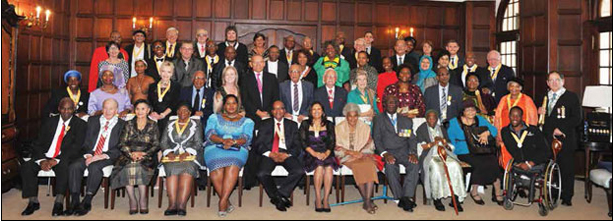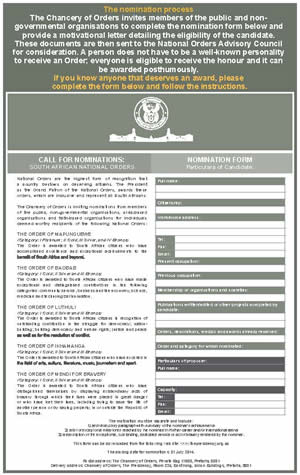Every year on Freedom Day, 27 April, the President bestows National Orders to carefully chosen South Africans and foreign nationals who have played a part in developing the country.
 The National Orders are the highest awards that the country, through its President, bestows on its citizens and prominent foreign nationals. They recognise the contributions made by individuals towards building a non-racial, non-sexist, democratic and prosperous South Africa in various ways.
The National Orders are the highest awards that the country, through its President, bestows on its citizens and prominent foreign nationals. They recognise the contributions made by individuals towards building a non-racial, non-sexist, democratic and prosperous South Africa in various ways.
This year, President Jacob Zuma bestowed National Orders to 54 recipients at the Sefako Mapogo Makgatho Presidential Guest House in Pretoria.
Speaking at the National Orders ceremony, President Zuma paid tribute to the heroes who contributed to the liberation of South Africa from apartheid rule.
“Working together, we have achieved a successful transition to a new society and have built a new nation out of the ashes of apartheid divisions.
“We thank all our international guests for your contribution to the achievement of freedom and democracy in our country,” he said.
“We have built a democratic state founded on the values of human dignity, non-racialism, non-sexism, the rule of law and universal adult suffrage as enshrined in the Constitution. We have built strong institutions that continue to support our constitutional democracy.”
The National Orders ceremony celebrates human achievement and is an opportunity to honour men and women who have left definitive footprints in both the struggle for liberation and also in building a better South Africa.
“Today we honour compatriots whose contribution puts the country in the global map be it in sports, the arts, business, science and through humanitarian acts,” said President Zuma.
The categories include the Order of Mendi for Bravery, the Order of Ikhamanga, the Order of the Baobab, the Order of Luthuli, the Order of Mapungubwe and the Order of the Companions of OR Tambo.
 Each recipient was awarded for making a meaningful contribution to the country. For example, Elizabeth Barrett was honoured with the Order of Mendi for Bravery in Bronze for saving 14 children from a burning house.
Each recipient was awarded for making a meaningful contribution to the country. For example, Elizabeth Barrett was honoured with the Order of Mendi for Bravery in Bronze for saving 14 children from a burning house.
Some of the well-known recipients included athlete and Olympic gold medallist Caster Semenya, who received the Order of Ikhamanga for standing firm against prejudice and Olympic gold medallist Cameron van der Burgh, who has also won a number of World Championship medals.
Soccer legend and businessman Jomo Sono also received the Order of Ikhamanga for his contribution to the development of football in South Africa.
“He has excelled as a gifted player, as a coach and a mentor who takes efforts to unearth youth soccer talent,” said President Zuma.
Also on the list was businessman Raymond Ackerman, actor Danny Glover and tennis player Lucas Sithole, who was awarded for proving that it is possible to reach the greatest heights despite physical disabilities.
President Zuma also had a special message for all the recipients of the Order of the Companions of OR Tambo. “We would like to give you a message from the former ANC President and Nobel Peace Prize winner Chief Albert Luthuli, delivering the Nobel Peace Prize lecture in 1961.”
“He said: ‘Alone we would have been weak. Our heartfelt appreciation of your acts of support for us, we cannot adequately express, nor can we ever forget; now or in the future when victory is behind us.’
“Indeed we shall never forget the solidarity we received from brothers and sisters in the continent and the world,” said President Zuma.
Where it all started
When the democratic government came into power in 1994, a decision was taken to make slight changes to the pre-existing titles of South Africa’s National Orders. This was done to ensure that the awards were a true reflection of a new South Africa committed to non-racism, non-sexism and human rights, while emphasising the importance of recognising the country’s unsung heroes and heroines.
All of the awards are significant and represent a specific industry or particular area of civil service in which the recipient excelled or contributed greatly towards. The recipients of the awards are not necessarily well-known, but are also ordinary people doing extraordinary things.



 Facebook
Facebook Twitter
Twitter WhatsApp
WhatsApp